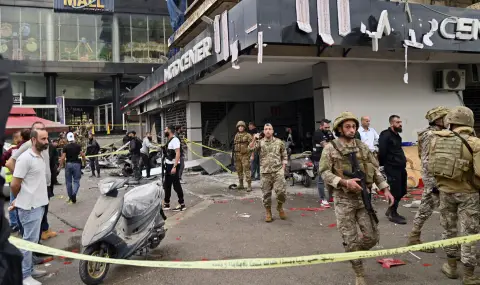Is Hezbollah's new leader Naim Qassem still in the country? Or has he already fled to Tehran to avoid the fate of his predecessor Hassan Nasrallah, whom Israel liquidated at the end of September? Or that of Hashem Safi al-Din, who was supposed to succeed Nasrallah but was assassinated in early October.
Every Hezbollah leader is on Israel's blacklist, and Naim Qassem certainly ranks first there. But regardless of where he is hiding, many Lebanese would not shed a tear for him, writes ARD.
"This is Hezbollah's war"
"When the death of Nasrallah was confirmed, I thought: now the world will become a little better,", says Ibrahim Asakram of the Christian party "Lebanese Forces". Like most Christians, he lives in the eastern part of the country, which has so far been spared heavy airstrikes. But he sees how Lebanon is dying because of the war.
"This is Hezbollah's war, not a war that Lebanon is waging against Israel. Hezbollah is a terrorist organization, it dragged us into it," he thinks.
The Christian parties "Lebanese Forces" and "Kataib" have always been staunch opponents of Hezbollah, with their feud dating back to the 15-year civil war. After its end in the 1990s, the Shia militia, supported and armed by Iran, became the dominant force in Lebanon. Since then, she has paralyzed any political process that could threaten her positions of power. Hezbollah is blocking justice and has undermined the entire state system, the German public media recalls.
Surrender does not count in Hezbollah's accounts
Three decades later, Lebanon is at war again. The loss of leaders and constant Israeli airstrikes have weakened Hezbollah significantly. But it is still capable of firing up to 200 missiles across the border every day. The group still seems strong enough to decide whether there should be a truce in Lebanon or whether the conflict will turn into a war of attrition, notes ARD.
Caretaker Prime Minister Najib Mikati continues to call on the warring parties to finally implement UN Resolution 1701: Israel to withdraw beyond the demarcation line and Hezbollah beyond the Litani River, while in parallel beginning monitoring of the demilitarized buffer zone from Lebanon army and from the forces of the UN peacekeeping mission in Lebanon UNIFIL. Hezbollah must then hand over its weapons to the Lebanese army, Lebanese Christian and Sunni politicians and ministers insist.
But for the Shia militia, handing over their weapons would be tantamount to surrender. And it does not enter Hezbollah's accounts. Sacrifices, martyrdom, resistance to the last man - these are the religious views of the Shia militia.
Christians, Sunnis and Druze against Hezbollah
The longer the war goes on, the more clearly Christians, Sunnis and even Druze are turning against Hezbollah. For them, Israel is an aggressor and an enemy, but they blame Hezbollah for the dire state in which the country is.
"The destruction, the airstrikes, the constant drones over Beirut and the permanent state of emergency are ruining the people here," Heiko Vimen of the International Crisis Group in Beirut told ARD. According to him, at least half of the population believes that Hezbollah has no right to involve Lebanon in such a conflict.
According to the Ministry of Health in Beirut, the dead so far are at least 2,800, and the wounded - 12,000. Dozens of villages in southern Lebanon have been destroyed, the southern part of Beirut is bombarded almost daily.
"Lebanon is no longer a country, it is in ruins," says the Lebanese writer Rasha al-Amir. "We know who is ultimately responsible for this: Iran and its Hezbollah supporters," she added to the German public-law media.
Author: Martin Durm (ARD)
